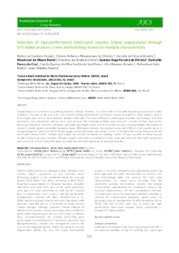Selection of high-performance black-eyed cowpea (Vigna unguiculata) through GYT biplot analysis: a new methodology based on multiple characteristics.
Selection of high-performance black-eyed cowpea (Vigna unguiculata) through GYT biplot analysis: a new methodology based on multiple characteristics.
Autoria: ARAÚJO, K. C.; OLIVEIRA, T. R. A. de; GRAVINA, G. de A.; ROCHA, M. de M.; ALCÂNTARA NETO, F. de; OLIVEIRA, G. H. F. de; CRUZ, D. P. da; SANT'ANNA, C. Q. da S. S. de; GRAVINA, L. M.; ROCHA, R. S.; PEREIRA, I. M.
Resumo: Cowpea bean is a common crop quite appreciated in Brazil. However, it is known that its low yield depending on soil and climatic conditions. The aim of this research is the selection of high-performance black-eyed cowpea through GYT biplot analysis. Twelve (12) cowpea bean strains were assessed between 2016 and. The study followed a randomized complete block design, with four repetitions; two commercial cultivars were used ascheck. The following variables were assessed: number of days required for flowering, final stand, value for cultivation, pod yield, pod length, mean number of grains per pod and grain weight. The analysis of variance showed genetic variability between strains, differences between the assessed years and different strain-performance in each growing year. Based on the GYT biplot graph, cultivar BRS Itaim, and strains L9 and L7 recorded the best performance for the set of yield characteristics. Variable ?pod length? had positive correlation to bedding, number of days required for flowering and number of grains per pod. Variable ?100-grain weight? had positive correlation to final stand, pod yield and mean grain weight per pod. Strains L9, L7 and cultivar BRS Itaim recorded the best yield regarding the assessed variables.
Ano de publicação: 2021
Tipo de publicação: Artigo de periódico
Unidade: Embrapa Meio-Norte
Palavras-chave: Análise de variância, Associações de traços, Variedade, Vigna Unguiculata
Observações
1 - Por padrão são exibidas publicações dos últimos 20 anos. Para encontrar publicações mais antigas, configure o filtro ano de publicação, colocando o ano a partir do qual você deseja encontrar publicações. O filtro está na coluna da esquerda na busca acima.
2 - Para ler algumas publicações da Embrapa (apenas as que estão em formato ePub), é necessário ter, no celular ou computador, um desses softwares gratuitos. Sistemas Android: Google Play Livros; IOS: iBooks; Windows e Linux: software Calibre.
Acesse outras publicações
Acesse a Base de Dados da Pesquisa Agropecuária (BDPA) para consultar o acervo completo das bibliotecas da Embrapa.

